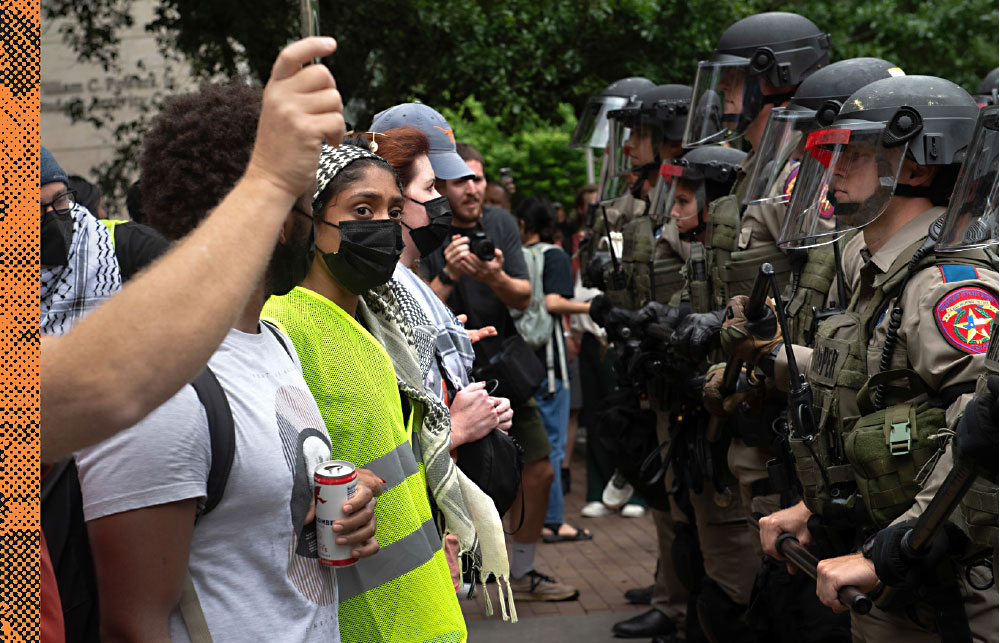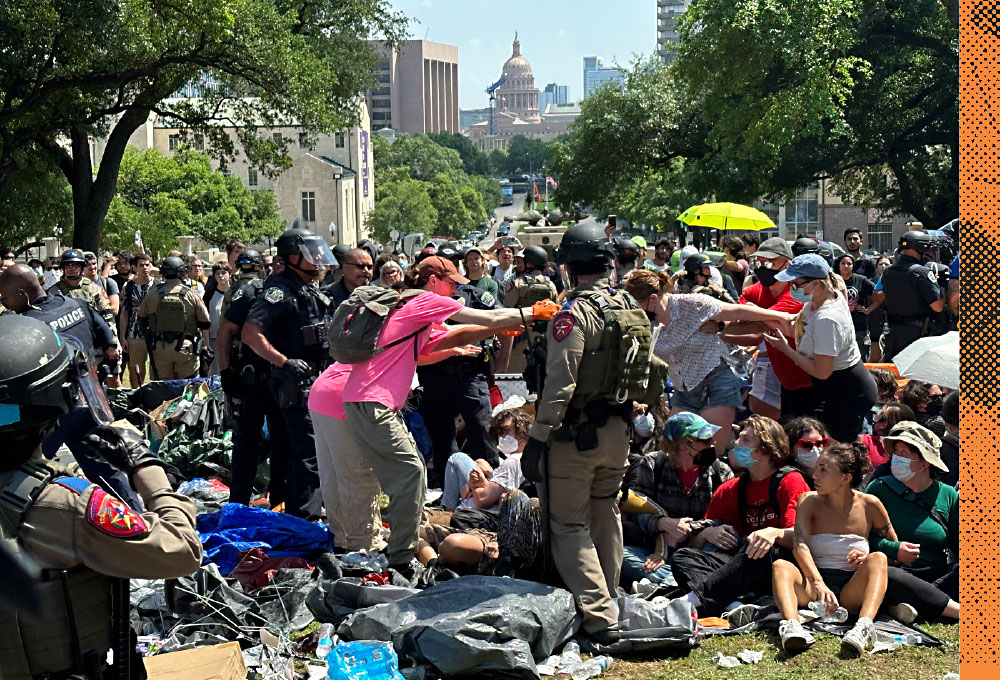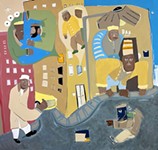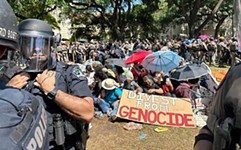UT’s War on Students
A peaceful protest spiraled when law enforcement showed up. Now the university has doubled down.
By Lina Fisher, Fri., May 3, 2024
Around noon on Monday, April 29, another day of protest at UT-Austin against Israel’s war on Gaza was beginning. After the previous week’s show of force by state troopers called in by university President Jay Hartzell resulted in 57 arrests, this week saw an even more chaotic escalation of state violence, with 79 more arrests. As protests continue, the eyes of the nation are upon UT-Austin, where its students join Columbia University and at least 50 other U.S. colleges in the most powerful student movement since the Vietnam War protests of the Sixties.
Students with the Palestine Solidarity Committee (PSC), a registered student organization that has since been suspended, have organized many peaceful actions since October, packing City Council chambers monthly in a push for a formal cease-fire vote and organizing a statewide protest that drew 10,000 people to the Capitol. Last Wednesday, they planned to follow Columbia’s lead, along with many other universities around the U.S., walking out of class to pitch an encampment on university property. Their aim was to pressure the administration to divest financially from weapons manufacturers selling to Israel.
Wednesday, April 24
Shortly after noon, students gathered at the Speedway Mall to walk to the South Lawn and set up camp. Planned activities included teach-ins, art-making, and a pizza break. Those activities were delayed by a massive police presence. Texas Department of Public Safety troopers on horseback, motorcycles, and on foot dressed in riot gear pushed into the crowd, making arrests with no provocation, as Gov. Greg Abbott wrote on X, “These protesters belong in jail” and “should be expelled.” University of Texas and Austin police officers assisted with zip-tying protesters as organizers in neon yellow vests, some wearing keffiyeh (a traditional Palestinian headscarf), tried to help corral the crowd. Volunteer legal observers took the names of those arrested.
As police moved the crowd off Speedway and toward the South Lawn around midday, troopers momentarily dispersed on motorcycles. On one section of Speedway, a pro-Israel contingent of students waved the flag of Israel. On the other side of the street, pro-Palestine students shouted, “You’re on the wrong side of history.” Walking up Speedway, a male student carrying an Israeli flag yelled at a girl wearing a hijab, “Why are you wearing a mask? What are you hiding?” She took off her face mask to yell back, “I’m not hiding anything.” Later, she told the Chronicle, “Police have generally been biased against people that are standing with Palestine. The anti-protesters have been actively instigating and the police have done nothing. I’m obviously gonna take precautions because I’m not trying to get expelled from the university.”
On the South Lawn, there were much fewer police. Students began setting up their encampment, with coolers, blankets, tents, and folding tables full of cupcakes, some playing drums or handing out water. The mood was calm for the moment, but then police reappeared, forming lines to push into the crowd and arrest protesters one by one, sometimes dragging them by their hair or feet. Protesters linked arms to form a barrier, but this scene repeated as 57 people were ultimately arrested, including a Fox 7 cameraperson.
Around 5:30, Rhiannon Hamam, a supervising attorney in UT Law’s Pro Bono Program who was scheduled to speak at the teach-in, was arrested. “I was on the perimeter of the lawn in a line of people facing the line of state troopers,” she said. “We were just standing, and they started pushing forward with their batons. A trooper snatched me out of the line, and I was thrown onto the lawn. They put me under arrest with zip ties behind my back and walked me to a Travis County Sheriff’s Office van.”
Hamam was taken to the Downtown jail, where she talked all night with other protesters “who had been quite violently arrested and injured,” said Hamam. “Almost all of the women talked about how they were sore from having been in zip ties that were incredibly tight for so long. One woman next to me had visible welts on her wrists.” Hamam said many had no idea why they were arrested: “So many of the women were like, 'I was standing in the crowd, and then I started to get pushed, and now I’m here.’” Hamam and others were released around 5am to a cheering crowd waiting with food and water outside the jail. Hours later on Thursday, she spoke at a protest in which UT faculty and staff announced they’d lost confidence in Hartzell’s leadership and demanded his resignation.
Monday, April 29
This past Monday’s protest escalated far beyond the violence seen the week before. An impromptu encampment not organized by the Palestine Solidarity Committee sprang up on the South Lawn around noon. PSC told the Chronicle it was “supportive of the encampment but not the organizers.” A group of around 50 people blockaded themselves in a circle with folding tables and signs reading “divest from genocide.” By 1pm, hundreds of police and state troopers had surrounded them, along with a supportive crowd.
State troopers in riot gear encircled the encampment and arrested people one by one. As the day wore on and got hotter, medics brought in water bottles and escorted unconscious protesters experiencing heat exhaustion out of the encampment. At least one protester vomited from dehydration as she was being arrested. Troopers and APD issued multiple orders to disperse and continued arresting people, sometimes dragging them on the ground or in the air out of the encampment. Protesters chanted “who failed Uvalde? You failed Uvalde,” and “free, free Palestine.”
The day hit a breaking point after the last encampment protester was arrested around 4:15pm. As the crowd on the South Lawn dispersed, another crowd was forming farther down 22nd, attempting to block the Guadalupe entrance and prevent law enforcement vans carrying the arrested from leaving. State troopers – some carrying automatic weapons – and protesters pushed against each other. Police pepper-sprayed the crowd, which then retreated to pour bottles of water into the eyes of those who were sprayed. Injured students were treated by Austin Fire Department paramedics in Sutton Hall, the Statesman reported. As protesters pushed back harder, law enforcement set off flash-bang grenades, which caused the crowd to break up. But as the smoke cleared, enraged students pushed police back up 22nd toward the Tower, chanting “off our campus,” and attempting to block a bus full of state troopers trying to leave. Around 5pm, the bus finally left and turned onto Dean Keeton to applause from the protesters. Like last week, a crowd formed outside the Downtown jail that evening, to signal support for those arrested.
The Aftermath
On Tuesday, PSC – though formally suspended – held a teach-in on the South Lawn and discussed the week’s events. The scene was much more peaceful than the day before, with only about 10 UTPD officers present. As Karma Chávez, chair of Mexican American and Latina/o Studies, and Pavithra Vasudevan, assistant professor of Women’s & Gender Studies and African Diaspora Studies, discussed scholasticide in Gaza – the systematic destruction of universities – students asked questions. They expressed dismay at the media’s focus on violence at campus protests and said the teach-in was partly meant to “remind the press what this is about. They have a duty not just to report on what we’re doing, but why we’re doing it.” The only conflict came from a small group of pro-Israel students who heckled Chávez, Vasudevan, and PSC organizers, who for the most part declined to engage.
UT released a statement Tuesday defending its response, claiming 45 of the 79 protesters arrested Monday were “believed to be non-UT affiliated individuals ... with ties to escalating protests at other universities around the country.” The Chronicle was not able to confirm that claim as of press time. The statement continued that “weapons have been confiscated in the form of guns, buckets of large rocks, bricks, steel enforced wood planks, mallets, and chains.”
On Tuesday afternoon, UT Board of Regents Chairman Kevin P. Eltife released a statement: “We will continue to call upon the DPS to secure our campus when needed ... we will make every effort to see that students who violate campus policies and outside individuals and groups that violate state law are fully prosecuted.”
By Friday, April 26, all charges against those arrested Wednesday had been dismissed by judges and County Attorney Delia Garza; but the 79 people arrested Monday – all for criminal trespass, with two individuals also charged with additional misdemeanor offenses – may have a harder legal road ahead. Affidavits obtained by the Chronicle are much more detailed than last week’s and thus more likely to be accepted by prosecutors and judges. County Attorney Delia Garza said in a press conference April 30 that the cases remain active and will be reviewed individually, but she could not say when her office would reach decisions on prosecuting the arrested protesters.
Garza added that arresting protesters in such large numbers on low-level nonviolent offenses is putting a “tremendous strain on our criminal justice resources” and that she has reached out to UT to find a better way. “It is not the role of the criminal justice system to jail people for conduct that has not yet occurred or that might occur, nor to assist our governor in efforts to suppress nonviolent and peaceful demonstrations.” As the Chronicle went to press May 1, the arrested protesters had been released from jail.
Other local elected officials have disapproved of UT’s reaction to student protest as well. City Council Member Zo Qadri wrote on X that the “excessive show of force was a bad move,” and CM Vanessa Fuentes wrote, “Suppressing peaceful protest with intimidation is a needless escalation.” City Council is expected to hold an executive session – at the request of Qadri, CM Ryan Alter, and CM Chito Vela – to discuss APD’s role in the campus protests. Texas Republicans have taken the opposite position: 34 House GOP members released a joint letter countering the student protests at UT: “We reject terrorism ... physical and mental intimidation ... including on our university campuses. Israel has a fundamental right to defend itself and should use any and all means necessary to destroy terrorism, which includes wiping Hamas from the face of the Earth.” PSC’s demands, by contrast, remain clear, peaceful, and simple: divestment from weapons manufacturers that do business with Israel; full amnesty for student protesters arrested and PSC; and the resignation of Hartzell.
Another protest planned for May 1 by the Austin Democratic Socialists for America, Texas Young Active Labor Leaders, and Underpaid at UT, was postponed to May 5. As students and professors continue to be beaten, arrested, and tear-gassed by police forces across the U.S., pro-Israel counter-protesters shot fireworks into an encampment at UCLA and beat pro-Palestine protesters Tuesday night. Meanwhile, Israeli forces are invading the Gazan border city of Rafah, adding to the already 34,000 Palestinians killed. As the Chronicle went to press Wednesday, the Biden administration was still attempting to secure a deal with Israel for a temporary cease-fire and the release of Hamas’ hostages.
For more on this developing story, check austinchronicle.com/news and follow our news reporters on X: @11nafisher, @daustinsanders, @brantbingamon, @maggietatx.
Got something to say on the subject? Send a letter to the editor.














